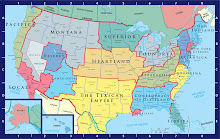
AREA
76,000 sq.m. (15th)
POPULATION
13,308,000 (11th)
DENSITY
175 people per square mile. (6th)
CAPITAL
Raleigh, Pamlico
STATES
Virginia (Richmond), Pamlico (Durham), Charlotina (Charlotte), Palmetto (Charleston)
RELIGION
Protestant, Catholic, Various
LANGUAGE
English, various
NATL INCOME
539 billion
MEDIAN INCOME
$40,480 (13th)
ECONOMY
The economy of Carolina is average but improving. An ANTU member nation, it freely trades resources with its other member nations. Being the strongest ANTU exporter of pigs, tobacco and peanuts, it has been able to keep its independence and economic position strong despite its smaller land area and lack of natural resources. Its cities, including Richmond, Raleigh, and Charlotte, have some strong finance and industry, especially in textiles and electronics. Carolina is largely dependent on Canada and Foundrya for oil and natural gas, which has led to recent flirtations with the Empire of Texico for free energy trade. The cost of living is median.
OVERVIEW
The nation of Carolina was created with the Redivision Act of 1994, with land from Atlantica and Appalachia (though some of this land, specifically the western half of South Carolina now known as Piedmont, would shortly thereafter be annexed to Dixieland). Its founders, notably its first President Jesse Helms, envisioned an independent, conservative government like Appalachia, but with a more up-to-date and less agrarian economy. Internationally, it is not as active as its other ANTU neighbors, although maintains a strong position in continental trade, and has a quickly growing economy due to some smart investing in high-tech fields. Carolina has had a generally stable government, although none of its presidents have yet served more than one term. Due to the death of President James Baxter Hunt in 2003, L. Douglas Wilder became the first African-American in the high office outside of Neorleans (although he was not re-elected on his own right). Recently Carolina has been more aggressive in its international relations, even apparently opening trade talks with the Empire of Texico, which has been roundly criticized by the other ANTU nations. There is some concern that the more conservative administration of President Elizabeth Obenshain bears a stronger ideological tie to Texico than the other northeastern nations; if Carolina were to shift alliances to its southern neighbors, the balance of power on the continent would change drastically.
HEAD OF STATE

President Elizabeth `Libby’ Obenshain,
Republican-Conservative Party

Vice President George Allen,
Republican-Conservative Party

No comments:
Post a Comment